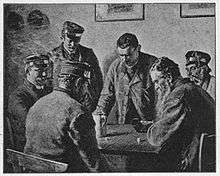Dienstmann
A Dienstmann (plural: Dienstleute or, in Austria, Dienstmänner) was a medieval retainer or vassal and, later, a hired man, in German-speaking countries, particularly in Austria until the first half of the 20th century.


Usage
The term Dienstmann first surfaced in the Middle Ages as a Germanicization of the Latin word ministerialis,[1] for men, who served at a court and, in the course of time, were raised to be armigers with a social status similar to that of free knights (Ritter).[2]
However the term Dienstmann could also refer to men who were obliged to pay duties or render socage to their liege lords a socager, or socman. Unlike ministeriales, they held a lower social rank equivalent to the English serf.[3]
Later, the term described was used to describe a hired man who, in public service or in a private household, was contracted to perform time-limited functions of all types in return for a fee. His main duties were the carriage of belongings, such as suitcases, and messenger duties.
In fiction
Well-known fictional Dienstmänner are the Dienstmann, Alois Hingerl, in Ludwig Thoma's Satire Ein Münchner im Himmel or Hans Moser and Paul Hörbiger, the Dienstmänner in the film Hallo Dienstmann. As a so-called Berliner Original, the Dienstmann, Ferdinand Strumpf, went under the name, Eckensteher Nante.
References
- Thompson, p. 470.
- Delbrűck, p. 254, note 17
- Bachrach, Bernard S. "Charlemagne and the Carolingian General Staff" Journal of Military History 66, no. 2 (2002) p. 316-7
Literature
- Hans Delbrück, trans. Walter Renfroe Jr. History of the Art of War, Volume III: Medieval Warfare (Lincoln, NE: University of Nebraska Press, 1982)
- Fritz Keller: Hallo Dienstmann! In: Wiener Geschichtsblätter 62. Jg., 2007, ISSN 0043-5317, pp. 1–16.
- Fritz Keller: Ignaz Israel Pokart – der letzte jüdische Dienstmann. In: Verena Pawlowsky, Harald Wendelin (ed.): Raub und Rückgabe. Vol. 2: Arisierte Wirtschaft. Mandelbaum-Verlag, Vienna, 2005, ISBN 3-85476-161-9, pp. 85–88.
- Valentin Ferdinand von Gudenus, Friedrich Carl von Buri, Heinrich Wilhelm Anton Buri (ed.): Codex Diplomaticvs. Exhibens Anectoda Ab Anno DCCCLXXXI, Ad MCCC. Mogvntiaca, Ivs Germanicvm, Et S. R. I. Historiam Illvstrantia. 5 vols., Göttingen etc., 1743–1768.
- Wilhelm Scherer (ed.): Hohenfurter Benedictinerregel. In: Zeitschrift für deutsches Alterthum NF 4 = 16, 1872, ISSN 1619-6627, pp. 224–279.
- Richard Schröder: Lehrbuch der deutschen Rechtsgeschichte. 6th revised edition by Eberhard von Künßberg. de Gruyter, Berlin etc., 1922.
- James Westfall Thompson. "German Feudalism". The American Historical Review 28, no. 3 (1923) 440-474.
External links
| Wikisource has original text related to this article: |